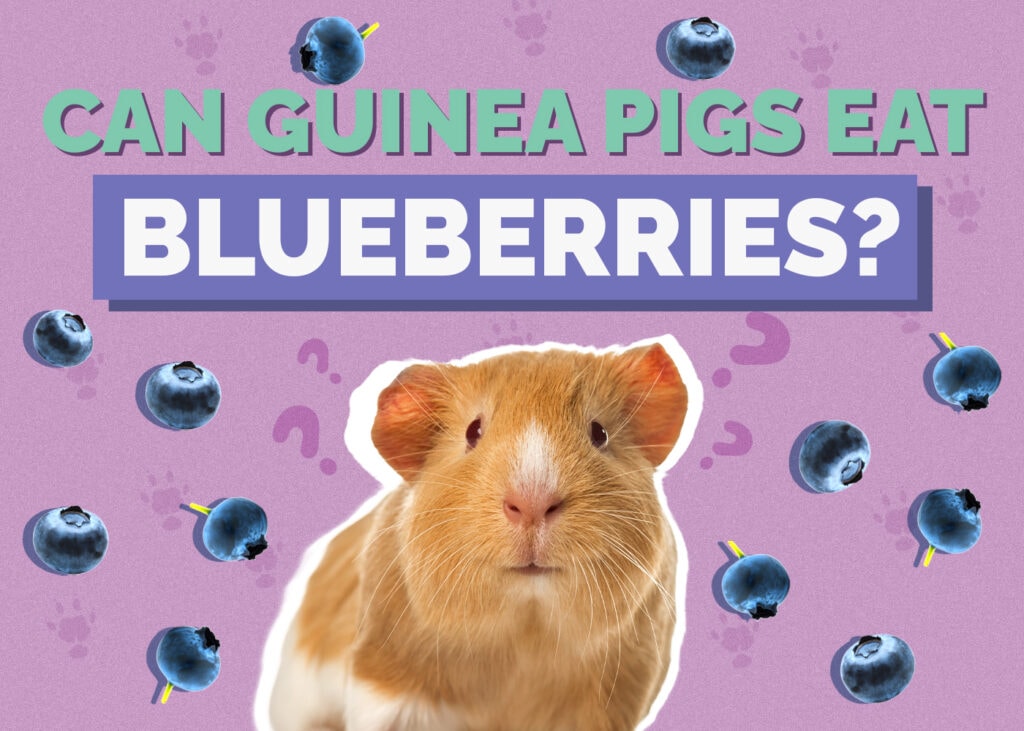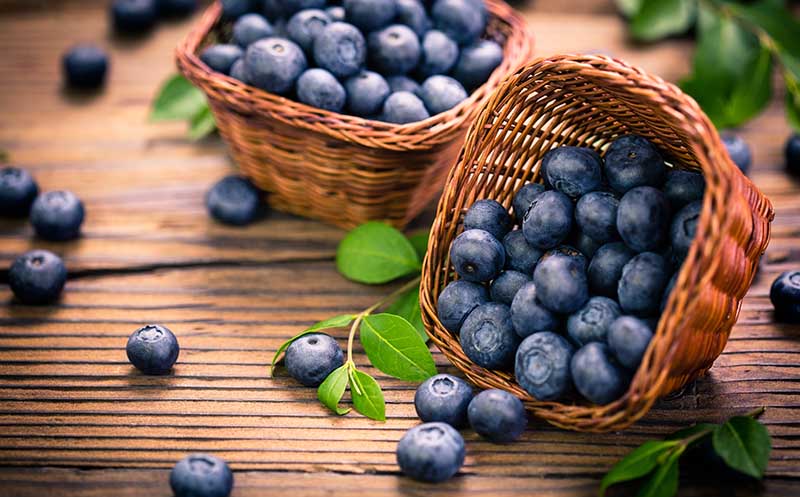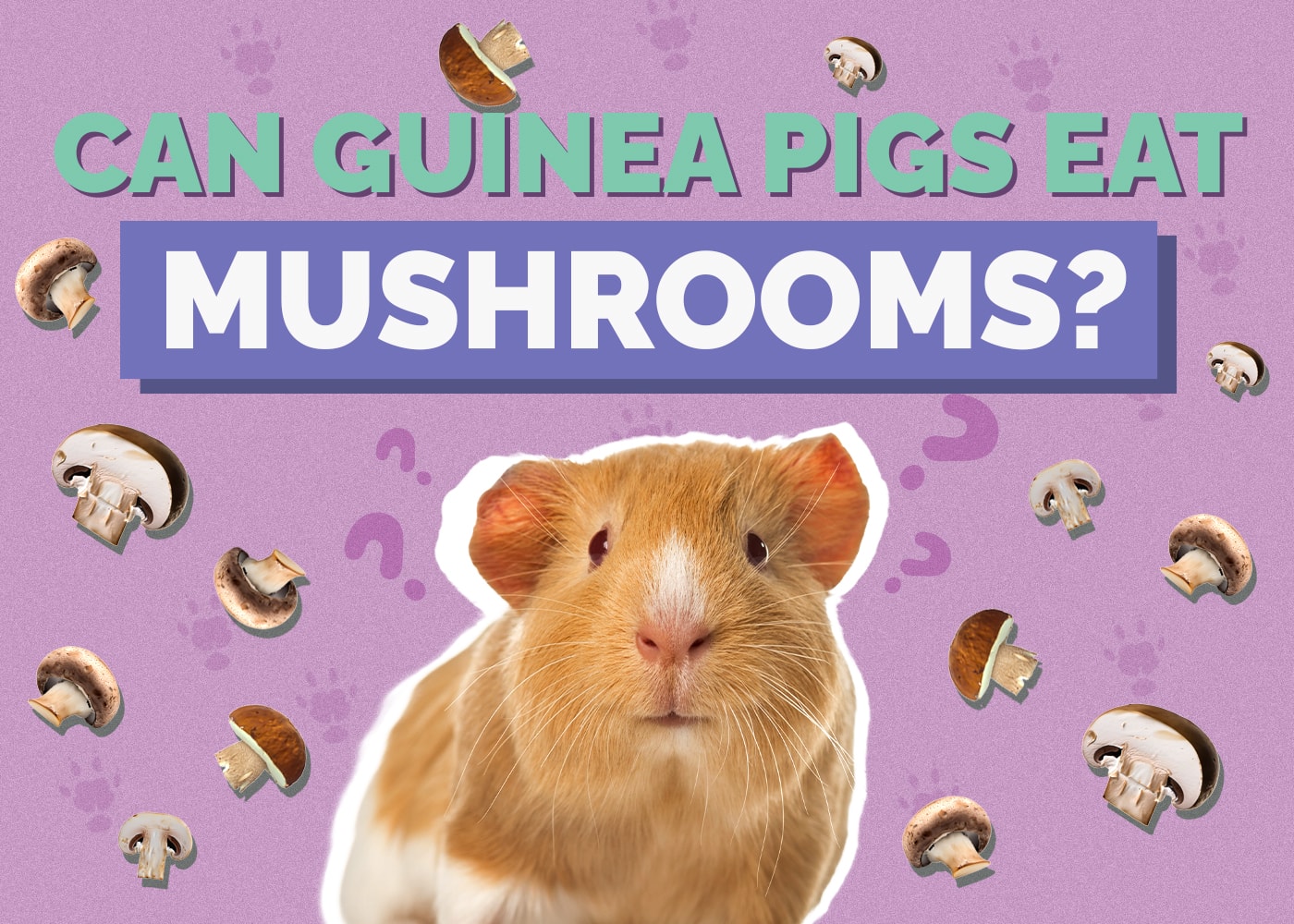Can Guinea Pigs Eat Blueberries? Vet-Approved Nutrition & Diet Facts
By Ashley Bates
Updated on

Click to Skip Ahead
We love our little herbivorous guinea pig friends and the adorable way they down fruits and veggies. If you’re looking for a more exciting variety of goodies to give your little piggies, you might wonder if they can eat blueberries and just how nutritionally beneficial they are.
Like many berries, blueberries are a delightful, nutrient-rich snack for guinea pigs. However, portion control is everything! Guinea pigs need a very particular diet, so it’s crucial to ensure they’re eating their “needs” first and their “wants” later.
Guinea Pigs Can Eat Blueberries
Blueberries are packed full of essential vitamins and minerals that nourish your guinea pig. They also have one of the highest antioxidant contents of any other fruit or vegetable. Guinea pigs can certainly eat blueberries—and most will love doing so.
Even though blueberries contain natural sugar, blueberries are surprisingly low in calories but high in fiber. They will help your guinea pig’s gastrointestinal system eliminate as it should.
Blueberry is also proven to be a very easy snack selection for your guinea pigs to consume. They are perfectly sized, fitting in their tiny paws, and soft enough to be chewed up quite easily.
But as with anything else, blueberries are just one of many items your guinea pig should have in their diet.
Other far more essential food items contain nutrients that keep your guinea pig’s body in alignment. So we will discuss all of the nutrient benefits of this blue superfood and how you can appropriately incorporate this fruit into your piggy’s diet.

Blueberry Nutrition Facts
| Serving Per: | 0.5 cup |
| Calories: | 42 |
| Sodium: | 1 mg |
| Total Carbohydrates: | 11 g |
| Sugar: | 7 g |
| Protein: | 1 g |
| Vitamin C: | 8% |
| Vitamin A: | 1% |
Antioxidant: A Blueberry Superpower
Blueberries are full of antioxidants! Antioxidants fight free radicals in the body, preventing some pretty nasty health conditions. These healing properties protect the body from many illnesses, including diabetes and cancer.
While your guinea pig’s body can provide its own antioxidant defenses to keep free radicals from harming the body, having a little extra boost never hurt any piggy!
A Guinea Pig Diet: Why It’s Crucial to Know
Guinea pigs have a very particular diet. Knowledge of their needs is a vital part of care. Lacking in some departments nutritionally can create more significant health issues, including deficiencies that can wreak havoc on their bodies.
Guinea pigs are small herbivores that require a blended nutrition of plant-based substances. It is crucial to buy commercial pellets explicitly designed for guinea pigs to ensure they’re getting every nutrient their body needs.
Their daily diet should consist of commercial pellets, hay, and a small portion of fruits and vegetables to keep them healthy. When it comes to fruits and vegetables, it’s essential to change them and not offer too many sugary substances as add-ons to their regular diet.
Also, when buying commercial food, it is best to buy blended pellets instead of mixed bags of seeds, pellets, and dried food pieces. That is because guinea pigs will cherry-pick all of the goodies and leave out some vital nutrients, which can deplete them over time.
Balance is incredibly important for guinea pigs, and as their caretakers, we need to ensure they’re getting appropriate portions of all necessary dietary items. It is incredibly important to offer fresh fruits and vegetables, just like blueberries. The problem only exists once the amount overrides what they need.
Your guinea pig can eat up to a cup of fresh fruits and vegetables per day. Rather than sugary blueberries, they require high vitamin C items like bell peppers and leafy greens.

When Should You Avoid Blueberries for Guinea Pigs?
Blueberries are full of natural sugar and are fairly acidic. But eating too many blueberries can impact your Guinea pig system in the following areas.
Sensitive Gastrointestinal Tracts
Guinea pigs can be incredibly sensitive. Their digestive systems are very particular and require a specific diet to keep them functioning at their prime. Some guinea pigs can be very sensitive to certain fruits, vegetables, and commercial foods.
Minor changes in the diet or digestive process can lead to gastrointestinal disease in guinea pigs. Issues like diarrheal disease come from alterations in intestinal microflora, throwing off balance.
If you have a particularly sensitive guinea pig, feeding them blueberries might upset their bellies.
Oral Sores
Guinea pigs won’t obviously show signs of illness or discomfort as a defense mechanism. Oral sores can form if guinea pigs’ food is quite acidic, causing significant pain. That’s why it is vital to be proactive and feed guinea pigs as directed.
- Lip inflammation
- Scabs or sores along mucocutaneous junction on lips
So, if your guinea pig is already prone to these sores, blueberries might further irritate the areas or cause sores to develop from acidity. Vets will typically clean the sores with a mild antiseptic and potentially topical or systemic antibiotics.
Urinary Tract Infections
Blueberries aren’t directly linked to urinary tract infections but can contribute. However, an overabundance of blueberries can have the opposite reaction. Appropriate portions of blueberries in the diet decrease your guinea pig’s risk of developing a UTI.
- Bloody urine
- Straining to urinate
- Yelping when urinating
- Lethargy
- Weight loss
- Lack of appetite
Typically UTIs in Guinea pigs are treated with enrofloxacin or meloxicam, two antibiotics. The chosen antibiotic will depend on what strain of bacteria is found in your little piggy’s urinary tract.

Consequences of Feeding Too Many Sugary Foods to Piggies
It might seem like sugary foods would only lead to obesity in guinea pigs. While that’s true, it’s actually a lot more serious than that. Sugar can affect the gut flora in a guinea pig, producing an overgrowth of bad bacteria that negatively impacts the digestive system.
Even though one blueberry won’t tip the scales, offering your guinea pig too many sugary fruits and veggies will impact their gut over time. Their systems aren’t designed to digest high-sugar items, no matter how delicious they might be.
That is why many vets and professionals recommend avoiding starchy or sugary veggies like carrots. It’s the same concept. So, while yummy, moderation is key.
How to Feed Your Guinea Pig Blueberries
Blueberries will give your guinea pig all of the nutritional benefits without taking from anything else they might need in their diet. You can feed your guinea pig blueberries roughly once to twice a week. Make sure there’s a singular blueberry with their other goodies each time.
Giving your guinea pig too many blueberries is an overabundance of sugar in their diet. As we mentioned previously, that can throw off their gut balance. So just make sure to give them a little treat now and again throughout the week, in addition to their other foods.
Always Wash Fruits Thoroughly Before Serving
Guinea pigs can have very sensitive digestive systems. Fruits can have a number of questionable substances on them. That is why it is so essential that you properly wash blueberries before feeding them to your guinea pigs.
Give Organic Blueberries When You Can
Let’s face it, the consumption of pesticides isn’t good for anyone, humans or piggies. To reduce the risk of exposure to pesticides and other toxic chemicals, consider organic berries when you want to go the extra mile.
If you can’t feed them organic blueberries, thoroughly wash the berries before serving. Even though removing all of the pesticides on our fruits and veggies is impossible, we can try as much as possible.

Guinea Pigs + Blueberries: Final Thoughts
So now you know that blueberries can have a blueberry or two per week. They will likely love these delicious sugary fruits. Just remember to appropriately portion them so they don’t get too much and suffer consequences because of it.
So, just follow the rules! Ensure your guinea pig is getting the appropriate diet for their daily needs and give them a couple of add-ons like blueberries to spruce up the meal.
- Related Read: Can Guinea Pigs Eat Oranges? Vet-Reviewed Diet Facts
Featured Image Credit: Congerdesign, Pixabay












